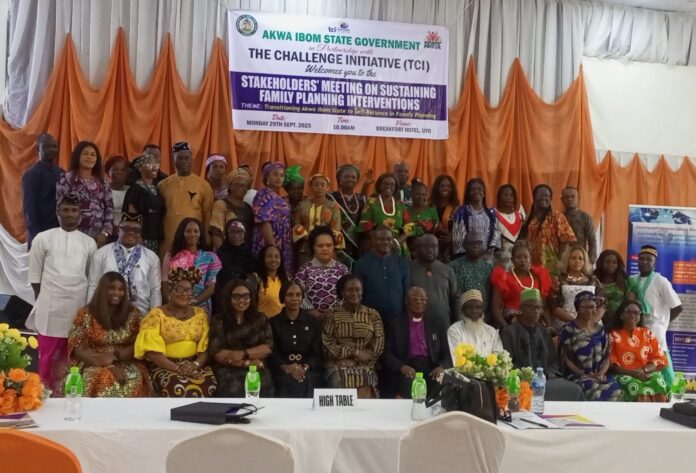The Challenged Initiative (TCI), a non-profit organisation known for promoting family planning and adolescent reproductive health, has called on the Akwa Ibom State Government to sustain and expand family planning services as the organisation concludes its direct technical support in the state.
Speaking during a transition meeting themed “Transitioning Akwa Ibom State to Self-Reliance in Family Planning” held in Uyo, the Country Director of TCI, Dr. Taiwo Johnson, urged the government and stakeholders to build on the strong foundation already laid over the past three years.
Dr. Johnson stressed that the time had come for Akwa Ibom to shift from depending heavily on donor funding to increasing its own financial commitment to reproductive health services, including family planning.
“As we celebrate our progress today, let us move forward with dedication and optimism towards self-reliance. This means more government funding and less donor support,” she said.
She noted that a new phase of TCI would launch next year with a revised focus, but promised to continue monitoring Akwa Ibom’s progress from behind the scenes.
Over the last three years, TCI has partnered with Akwa Ibom health agencies, civil society groups, and community leaders to increase access to family planning services and promote adolescent and youth sexual and reproductive health (AYSRH), especially among the urban poor.
Their work included training health workers, improving supply chains, debunking myths, and encouraging the uptake of modern family planning methods.
The transition meeting brought together government officials, civil society organisations, media advocates, and other partners who praised TCI’s efforts and discussed how to ensure sustainability now that TCI is stepping back.
Dr. Mmandu Ekpenyong, Chairman of the Ibom Life Saving Advocacy Organisation, thanked TCI for its service and urged the Akwa Ibom State Government to take full ownership of family planning programmes by contributing to the national basket fund and ensuring a steady supply of commodities.
“There is a need to inaugurate Local Government Family Planning Action Committees to support sustainability efforts,” she said.
On her part, Mrs Enobong Eshiet, the State Family Planning Coordinator, called for stronger advocacy to reinforce stakeholder commitment, particularly from the government and private sector. She also emphasised the need for timely release of funds to prevent stockouts of family planning supplies.
At a media review meeting held by the Akwa Ibom State Media Advocacy Group on Family Planning, Mr. Mayowa Adeniran of Development Communications Network (DevComs) encouraged journalists to explore ways of sustaining media advocacy beyond donor funding.
He noted that the platform could also be used to promote other health-related programmes, even as the state moves towards self-reliance.
Dr. Obasesam Edet, TCI’s State Programme Manager, commended media partners for playing a key role in publicising the importance of family planning and breaking down cultural barriers.
“We are proud of the work done by our media partners. Their role in creating awareness and countering misconceptions has been critical,” he said. “TCI remains available to provide technical support when needed.”
Mrs Grace Usen, the Media Advocacy Group’s Desk Officer, added that continuous partnerships and creative strategies are necessary to maintain momentum and increase service uptake across the state.
Family planning remains a critical component of Nigeria’s healthcare system. It plays a key role in reducing maternal and child mortality, improving family health, and supporting economic development.
Akwa Ibom, like many Nigerian states, still faces challenges in access, funding, and cultural acceptance of modern contraceptive methods.
With TCI exiting its direct support, the responsibility now falls on the state government and stakeholders to ensure that the progress made is not lost.
As Dr. Johnson aptly put it, “With the expertise in this room, Akwa Ibom State will emerge stronger and more resilient.”

